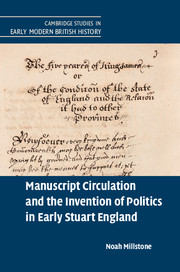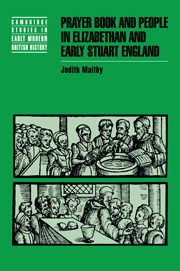Manuscript Circulation and the Invention of Politics in Early Stuart England
In the decades before the Civil War, English readers confronted an extensive and influential pamphlet literature. This literature addressed contemporary events in scathingly critical terms, was produced in enormous quantities and was devoured by the curious. Despite widespread contemporary interest and an enormous number of surviving copies, this literature has remained almost entirely unknown to scholars because it was circulated in handwriting rather than printed with movable type. Drawing from book history, the sociology of knowledge and the history of political thought, Noah Millstone provides the first systematic account of the production, circulation and reception of these manuscript pamphlets. By placing them in the context of social change, state formation, and the emergence of 'politic' expertise, Millstone uses the pamphlets to resolve one of the central problems of early Stuart history: how and why did the men and women of early seventeenth-century England come to see their world as political?
- Presents the first account of the large and important, but mostly unknown, political pamphlet literature from the pre-Civil War era
- Provides a narrative of early Stuart political history that differs in several major points from available standard treatments
- Uses a practice-based approach to political history
Reviews & endorsements
'In this learned and impressive book, Millstone provides scholars with such a survey [of scribal pamphleteering in the early Stuart era] and, more importantly, a persuasive argument about the different ways in which the circulation of manuscript pamphlets created, shaped and informed early modern English men and women's participation in and interpretation of politics … a groundbreaking contribution to the study of manuscripts, politics, and practices of dissemination and interpretation. To offer a thorough account of the nature and circulation of key scribal pamphlets in early seventeenth-century England is a significant contribution to scholarship, to simultaneously provide new ways of thinking about the invention of politics in the period is a remarkable achievement.' Alison Searle, Renaissance Studies
'Millstone offers a series of compelling arguments about the nature of early Stuart politics while posing fascinating questions about the long-term origins of the English Revolution. Lucidly written, robustly argued and theoretically informed, this is one of the most impressive debuts I have read in many years. … marvelous.' Alastair Bellany, The Spenser Review
'Noah Millstone's outstanding work supplies an invaluable survey of scribal pamphleteering during the Stuart era and provides rich new insights concerning the significance of their circulation. … By expertly addressing the manner by which 'collectors and diarists treated the texts themselves as forming a … political history of their own times' (167), Millstone bestows us with a modern equivalent that will prove useful to scholars with an interest in Stuart politics, regardless of their discipline.' Mark Kaethler, Renaissance Quarterly
'Millstone has produced a deeply researched and highly sophisticated book that will be of the greatest interest to scholars and students of early seventeenth-century England. He has an admirable capacity to delineate detail without ever losing sight of the broader picture. … In guiding us elegantly through the surviving products of early Stuart scribes it whets the appetite for future works from the author's own pen.' David L. Smith, The English Historical Review
Product details
May 2016Hardback
9781107120723
372 pages
237 × 158 × 25 mm
0.67kg
13 b/w illus.
Available
Table of Contents
- 1. Introduction
- Part I. Conditions of Production:
- 2. The social life of handwriting
- 3. Tuning the instrument
- 4. Performance and parliament
- Part II. Subjects and Subjectivity:
- 5. Bristol's revenge
- 6. Historians of the present
- Part III. The Secret History of the State:
- 7. The antiquary and the malcontent
- 8. The drift of the personal rule
- 9. The ill-affected
- 10. Conclusion
- Bibliography
- Index.






